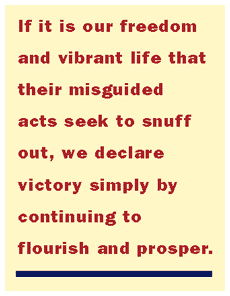by Sky Dayton
(Originally published after the attacks of September 11th, 2001)
I won't rehash that day—that has already been done eloquently and in abundance by others. And I feel very strongly that the best way for most of us to combat those who would do us in is to continue to thrive despite it all; if it is our freedom and vibrant life that their misguided acts seek to snuff out, we declare victory simply by continuing to flourish and prosper.
However, I will make a couple of observations about the Internet and communication in the context of September 11. I believe that the Internet has an important role in the long-term solution to hatred around the world and the terrorism it promotes.
POKEMON, KOBE BRYANT, AND THE KORAN
One ingredient missing among people who are blindly prejudiced against one another is the free exchange of ideas and communication. Other things may be missing as well, such as religious tolerance or even (as in this example) basic human decency. Evil does exist and must be handled with force, but even evil people require the support of others for their survival. Fortunately, the vast majority of people are basically good. But even good people can be misled.
Talking with a murderous lunatic will not make him sane, but it can wake up those who may fall under his spell. This is why maniacal dictators are so opposed to Western television and the Internet. They make claims about not allowing their cultures to be "corrupted"—but really, they're just keeping their populations in the dark. The worst terror will come from the places most isolated from the rest of the world.
The boom in Internet-enabled communication has already brought the civilized world closer together.It's common these days for us to send emails to people around the world. Through the Web, people of nations all over the Earth interact with one another billions of times a day, and in the process, learn of one another's cultures, customs, religions, dreams, and all the minutiae of daily life.
This communication creates aspects of common reality and an affinity among people. It's hard for prejudiced but basically decent people to support the murder of innocents when they have seen their faces and share a common reality. Even if that common reality is a love of basketball stars or the latest Pokemon craze. Again, I'm not talking about curing lunatics here—only those who might fall under their spell.
It used to be that realities were divided by geography, by the thousands of miles that separate people and cultures. The Internet promises to erase the space between people and make geography irrelevant. This is especially important in those places still isolated from the outside world today.
THE INTERNET SURVIVES A TERRIBLE TEST
It's hard to believe that back in 1994 many considered the Internet a novelty. Critics made condescending comparisons to CB radio. The Internet, they said, was just a passing fad. How silly and wrong they were.
 The Internet has grown up in seven years and taken its rightful place as a primary communications medium along with television, radio, and print. This was more obvious than ever on September 11.
The Internet has grown up in seven years and taken its rightful place as a primary communications medium along with television, radio, and print. This was more obvious than ever on September 11.
We've all heard the stories of people from New York City instant messaging friends to let them know they were OK, of millions of family and friends checking up on each other across the world by email, of the Web providing instant detailed information on every aspect of the situation in a way no other medium can. Phone lines were jammed, but emails got through.
September 11 has passed, and we're still here. The Internet is still here, and its value to our culture is greater and more obvious than ever before. Moreover, the Internet is now an important ingredient in bringing people out of the darkness of isolation and erasing hatred around the world.
More communication is always better. Enough of it will illuminate even the darkest corners of the Earth, build common realities, and even create affinity and understanding between people where there was only blind, ignorant hatred before.
At EarthLink, this is why we come to work in the morning—to bring about a better world through the free exchange of communication between people over the Internet. This is our mission, and our contribution.